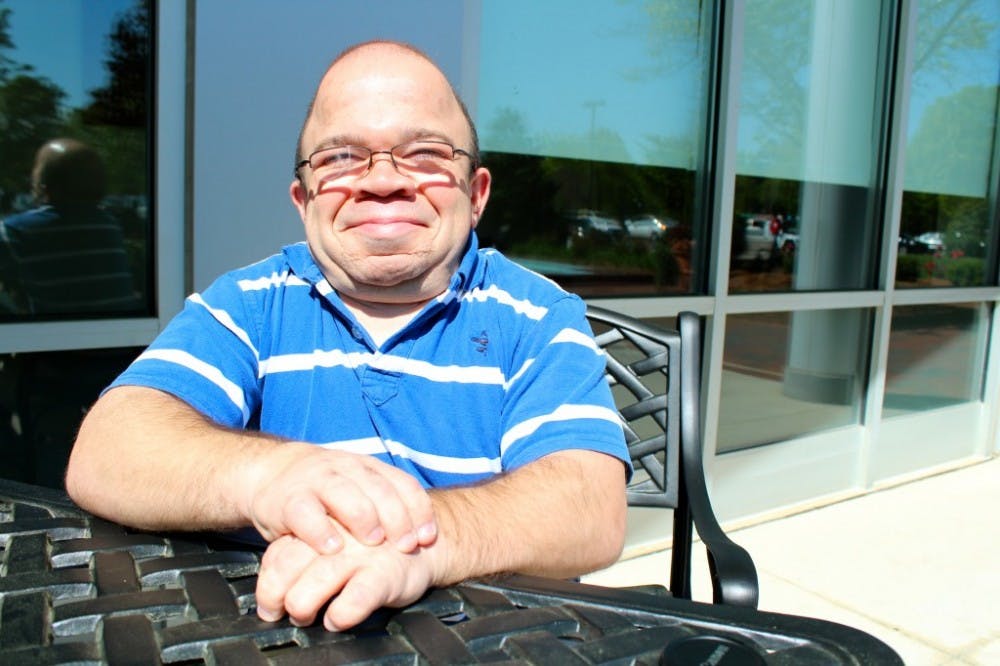When he goes out in public, children point and laugh.
“When I was younger and this happened, I hated it,” Alamance County resident Christopher Dutcher said. “I just wanted to beat the kids up, and I hated little kids forever because of it. But in recent years I thought, ‘If I was a little kid and I hadn’t seen anyone that looked like me, I’d probably do the same thing.’”
So he changed. He began to wave and smile at children who treated him differently, realizing that exposure to diversity was all they needed.
Dutcher has two degrees, a love for Starbucks and a passion for fostering tolerance. He also has mucopolysaccharidosis type II, a serious disease caused by the body’s inability to produce specific enzymes.
“I started to think about how to tell people about (MPS) and I realized there’s maybe 1,200 cases in the country,” he said. “My particular one has 400. Two thirds of us are severe, which means they die younger, and they’re mentally affected. Their intelligence will go up until, at most 6, and then they’ll drastically decrease back to infancy.”
Dutcher is different. He is a fully-functioning adult, despite his 4 foot-4 inch height, limited hearing and eyesight and reduced lung capacity.
In order to share an understanding of MPS, Dutcher founded the charity Courage to Make a Difference. He said the organization has two purposes: to spread awareness and help find a cure.
After committing to the cause, Dutcher had to choose an outlet for communication. The decision came to him after years of interactions with children.
Courage to Make a Difference is not about bullying, Dutcher said. It’s about awareness and acceptance of people with differences — all differences. This expansion beyond physical disabilities allowed him to cater his lessons to Alamance Country children.
“In Alamance County, there’s a lot of exceptional children who have emotional problems, ADD, things like that,” he said. “I try to get children to think that it’s not their fault and they’re completely normal.”
Dutcher shows students photos of celebrities with similar disorders, including George Washington, Albert Einstein and Michaelangelo. He also reminds them that just because they don’t have a disability now, they may in the future, such as the late actor Christopher Reeve.
But, the joy he finds in working with students is hard to come by.
“I don’t have permission to do this in this county,” he said. “I was able to do it because a friend of mine is a teacher, so I did it at her school. Then I started to send out emails to everyone in the school district, and they told me I needed to get permission from someone else. I left the corporate world because I hate (fighting) red tape, and that’s all I seem to be doing right now.”
Despite this obstacle, Dutcher remains positive. After working in finance, marketing and fraud prevention, he finally feels he has a purpose.
“Going to school for so many years and then working, I always thought what I was doing was boring and mediocre,” he said. “I wanted to do something bigger, and I thought of all of the things I’m good at. I’m not the best at anything, but I’m good with people, and I know that.”
In May, Dutcher will begin the second phase of his journey toward awareness. He plans to travel the country, staying with 38 MPS families to document their daily lives. He hopes this film will get people to care by putting a face to the illness, which he said he believes the media sometimes fails to do without celebrities.
“I know if I was on ‘Jersey Shore,’ if I was a singer, everyone would be all over it,” he said. “But I don’t know anyone like that. Keenan Cahill became famous from YouTube, but he wants nothing to do with the MPS Society. He’s trying to make music his career, and he doesn’t do anything special. The only reason he’s famous is because he looks like he has MPS disorder.”
Now, Dutcher is making strides toward a future for those with MPS. He doesn’t question his positivity, it has become his safe haven despite physical challenges.
“I don’t have a choice. What else am I going to do?” he said. “It helps that you really start to appreciate what you have. You know what’s important and what’s not.”


